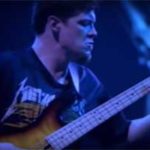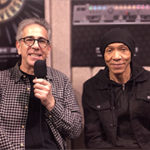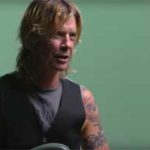Butcher Babies low-ender tells how he broke into the LA scene, via Italy, Switzerland
Exclusive interview with FBPO’s Jon Liebman
August 31, 2020
Ricky Bonazza is a multi-instrumentalist, producer, songwriter, and audio engineer. Since early 2020, Ricky has been the bassist for the heavy metal band, Butcher Babies, replacing Jason Klein.
FBPO: You have an interesting story. Tell me about your musical upbringing in Italy and how you became a bass player.
Ricky: I am from Italy, but most of my time I was actually in Switzerland, but going back and forth, there’s not really much difference. I always wanted to be a drummer, but we lived in an apartment, so my parents were like, “Sorry, we can’t buy a drum kit. It’s too loud.” So I was like, “What’s the next thing to drums?” And I started playing bass.
FBPO: Who were you listening to at the time? Who were your bass influences?
Ricky: Duff McKagan. I was a huge Guns N’ Roses fan at the time and I was like, “I want to be like Duff and I want to play bass.” So Duff got me into bass, but the person who actually is responsible for me pursuing a professional career was Steve Harris. When I got introduced to Iron Maiden and Steve Harris, that was the moment when I was like, “All right, man. I want to do this for a living. I want to be like Steve.”
FBPO: Tell me about moving to LA. That was a pretty bold move. You didn’t really know anyone there, did you?
Ricky: I’d spent a lot of time in Europe with my band. We toured all over the place, but, for some reason, it just wasn’t happening and there was not really a place like LA in Europe where you really have a scene. So I was like, “All right, I’ll grab my guitar and suitcase and I’ll leave.” It was the craziest decision of my life to leave everything behind! At the time, I was working for Apple. I had a really good job, security, with all the benefits. When I told this idea to people, they were like, “Dude, you’re crazy. You had everything and you’re risking everything just to go play music.”
FBPO: How old were you at the time?
Ricky: I think I was 28. I came to Los Angeles with a suitcase and my bass. I didn’t know anybody. I started going to school at Musicians Institute. I did two quarters there. That school was a landing base for me to start my journey.
FBPO: Who were your bass teachers there at MI?
Ricky: Well, that’s the funny thing. I didn’t actually study bass. I went to MI to study sound engineering. But I only did two quarters, just to meet people. But Musicians Institute helped me to set foot into this town (with) teachers and mentors there that I could ask for advice, so that was really helpful. But before that, it was really scary. And then, slowly I started playing all these jams and meeting more people. And one thing basically led to another. But it took a while to get used to everything because for me, it was a totally different country, new system, new rules, new people, new culture. Just new everything, and it was a challenge getting used to and adapting to all these new things and focusing on my career. So the first year was pretty intense.
FBPO: I’m trying to picture it: You arrived in LA with your bass in one hand, your suitcase in the other. Where did you sleep that first night?
Ricky: Musicians Institute provided dorms and stuff for students that arrived.
FBPO: Ah, so you were already enrolled in Musicians Institute before you moved to LA?
Ricky: Yes. It’s funny you mentioned that because I remember when I landed at LAX, I’m like, “And now what? Where am I going from here? I have a place to sleep tonight, but what’s going on tomorrow?” And all that stuff. So, yeah, pretty intense.
FBPO: I love it! How long after that did you join Butcher Babies? You’re a relative newcomer to that band, aren’t you?
Ricky: Yeah, I joined earlier this year. It took a while. I toured with many bands in the U.S. and I built a bit of a reputation before my name got mentioned to them.
FBPO: Who did you tour with?
Ricky: I was playing the hired gun. Bands would hit me up and say, “We need a player for this. Can you play this show or can you come on tour?” So I toured with a band called Dead By Wednesday. That was my first U.S. tour, and in 2019 we opened up for Flotsam and Jetsam. I don’t know if you know them.
FBPO: Yes, that was Jason Newsted’s band.
Ricky: That was Jason Newsted’s band before he joined Metallica. Exactly.
FBPO: Well, that’s a cool gig.
Ricky: It was pretty good. Yeah. So, the second tour that also happened that year was with a band called Zero Theorem. It’s a Los Angeles band also, and we opened up for Nonpoint. We went almost two months on the road with Nonpoint. And people know each other, so after that tour, I started doing a bunch of videos and I started building my social media with bass content.
FBPO: What kind of videos were you making?
Ricky: I was focusing on modern bands and I did a video of the Butcher Babies (music). And a friend of mine, Matt Fuller – he plays guitar in Puddle of Mudd – he was friends with them, and he saw my video and he’s like, “Hey man, are you looking for a gig or anything?” And I’m like, “Yeah. I’m always looking for that band,” and he was like, “because I saw your video and I’m friends with them. I know they’re looking for a bass player, so if you want, I can send them the video.” He did that, and shortly after, Henry (Flury) from the Butcher Babies got in touch with me and basically asked me to call come and play, to try out.
FBPO: What was it like when Jason (Klein) left? That was pretty amicable, wasn’t it?
Ricky: Yeah. I got to know Jason and he’s, to be honest, one of the sweetest guys I ever met. And he was really cool. I talked to him. We’re both bass nerds and he offered his help because Butcher Babies, as you know, they play in a very low tuning. They use 8-string guitars and stuff like that.
FBPO: Yes!
Ricky: So you can’t just grab a regular bass with regular settings and go and jam with them because it’s not going to work. You have to do some work on your bass.
FBPO: What was the adjustment like, filling in for him and taking your position there as the bass player in the band after he left?
Ricky: For me, it was an honor. In talking to Jason more and more, we have a very, very similar style and preference for a sound, so to me, it wasn’t much of a change. I’m just being myself and I bring a certain sound that they like. Jason had a similar sound, so it was not a big deal for me.
FBPO: That’s very fortunate, all the way around.
Ricky: Yeah. But what I noticed is that Jason, he’s really loved by the fans. You can tell that. And I thought that maybe people would be skeptical. But the reaction of the fans has been great and they’re also engaging with stuff that I do on social media, so it’s really cool that they accepted that. It was also Jason’s decision to leave. It’s not like there were bad things going on. It was just his decision.
FBPO: The band has a new album coming out, right?
Ricky: Yes. The album is finished, but with Corona and everything, everything is delayed.
FBPO: Tell me about your upcoming “virtual” concert.
Ricky: You’re talking about the European Metal Allegiance. A bunch of festivals got canceled, so they got together and did something for the fans, basically a virtual festival with bands from the lineups. Bands submitted footage from past live shows and stuff like that. On top of that, we did three quarantine-style videos, and that was really fun. We also had a guest from Anthrax, drummer, Charlie Benante. So that was really cool too. Very unexpected.
FBPO: Talk to me about your bass technique. You seem equally comfortable with your fingers and with a pick.
Ricky: Yes. Exactly. I’m more of a finger bass player. I prefer finger but actually, to be honest, I improved my picking skills here in Los Angeles because a lot of artists would require bass players to play with a pick. It’s not that common in Europe. Most of the time you play with fingers.
FBPO: Especially in the heavy metal and the style that you play. A lot of that requires a pick.
Ricky: Exactly. And I noticed that, especially in metal and also rock, some tunes just work better with a pick. It also depends on the song. It depends on the genre, most of the time.
FBPO: You mentioned tuning. How low do you tune down your bass?
Ricky: Well, sometimes it’s all the way down to drop A.
FBPO: Do you use standard gauges? Like a regular E string?
Ricky: No. I think I use a 5-string set on a four-string. I think it’s 135. The lowest E string is a 135. With Zero Theorem, I was tuned to drop G sharp.
FBPO: That’s low!
Ricky: I think that’s the lowest I went.
FBPO: What advice can you impart to someone who wants to learn to play the bass? What do you think is important for them to know?
Ricky: To me, it’s important to play as many songs as you can, in all different genres. I improved my bass skills in the last three years, extremely. I didn’t consider myself a beginner, but because here in LA, they have all these jam nights, so you get the song in advance. Today, you’re going to play a Led Zeppelin song. Tomorrow, you’re going to play a Katy Perry song. And so that helped me a lot, even though I consider myself an advanced player. But playing songs from different artists and different genres, again, from heavy metal, Lamb of God, to a Katy Perry pop song, to a Red Hot Chili Peppers song. I think that’s key to really improve your skills even more.
FBPO: Tell me about your bass gear.
Ricky: I just joined the Bergantino family. A friend of mine introduced me to them. I checked out the amps and (the sound) was just incredible. I’m playing the Forté HP. I have my DP-3X pedal, the dUg Pinnick signature, which has been with me since I bought it. I tried a lot of pedals, including all the Darkglass stuff, but man, that’s my pedal.
FBPO: Tech 21!
Ricky: Tech 21. Yes. It’s the dUg Pinnick. The DP-3X.
FBPO: I’ve interviewed dUg a bunch of times. He is a hoot!
Ricky: Yeah, he’s amazing.
FBPO: Tell me what you like about that particular pedal.
Ricky: The most incredible thing is the distortion and how it does not compromise your sound. So basically, you have your tone, and the distortion just lays on top of it. You keep your low end, you keep your tone as it is, but just more distorted. And that’s what I love about this pedal. And I told Dale (Krevens, Tech 21 VP), “Whatever guys did to this pedal, you nailed it. You nailed it!” And the EQ. There’s hip hop, there’s all kinds of genres. And I’m using this pedal for pretty much everything. It’s not even just for metal, but also if you’re looking for this round, boomy R&B tone, you can do it. It’s very versatile.
FBPO: Tech 21 does make some great stuff. What about your bass? You’re a Fender guy, right?
Ricky: I’m a Fender guy. I have two P basses. And I just recently got a five-string Jazz. Especially for the Butcher Babies, I wanted to get a 5-string to be a little bit more flexible with the tuning situation. But, during NAMM I tried so many basses, really because that was the time when I was trying to get a 5-string and I was like, “Man, maybe I should try something else.” Trust me, I tried them all! And I was like, “No, man, for me it’s Fender.” I just recently started to work with EMG. People ask about the tone a lot and that’s a big part of it.
FBPO: So you hot rod your P basses and your Jazz bass with EMG pickups?
Ricky: Yes.
FBPO: What kind of strings do you play?
Ricky: D’Addario ProSteels.
FBPO: What lies ahead? What else is on the horizon, as far as you can see?
Ricky: Some of the festivals are already confirmed us for next year, so that’s good. There are a few discussions with the Butcher Babies to do more stuff virtually, but it’s all just planning. Nothing’s really set in stone. For me, I’m here in the studio, writing music. I’m trying to get an EP done. And, a lot of songwriting, a lot of behind the scenes stuff in the studio, working with other artists. I’m always releasing new videos to try to create content for my pages. As for now, it’s really a little bit up in the air, but I’m definitely focusing on writing. I definitely want to release some of my music. A lot of people know me as a bass player and as a touring guy, but very few of them know that I actually write stuff for music libraries here in Los Angeles. I write stuff for other artists, for myself. My goal is to get a bunch of songs out that don’t just represent me as a bass player, but also as a musician in general, as a producer, a songwriter, an audio engineer.
FBPO: What would you be if you weren’t a bass player?
Ricky: That’s a good question. Probably something like a traveler, somebody who would travel the world.
FBPO: That sounds like a good job!
Ricky: Yeah. Jobwise, I’m really into psychological stuff, so I would probably try to be a therapist of some sort. I don’t know.
See Jon’s blog, with key takeaways from this interview, here.



